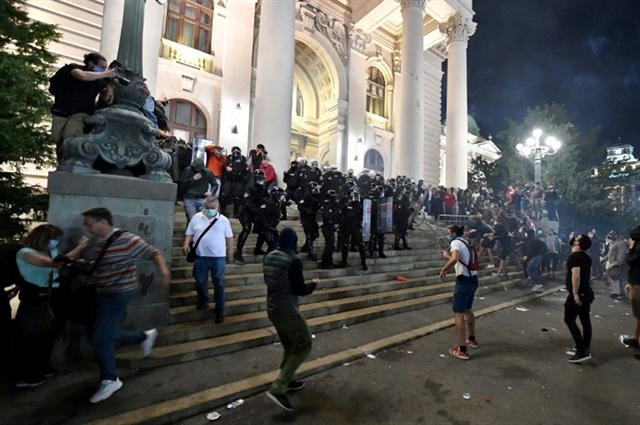 World
World


|
| Serbian police fires tear gas in front of the National Assembly building in Belgrade, on Tuesday to disperse thousands of protesters angry at the return of a weekend coronavirus curfew. — AFP/VNA Photo |
BELGRADE — Serbian police fired tear gas as thousands of protesters flooded into Belgrade on Tuesday night, angry at the return of a weekend coronavirus curfew.
The crowds protested in the city centre over the government's handling of the crisis, with infections now spiking after Serbia shed its initial lockdown measures two months ago.
Scuffles broke out between police and a group of protesters who stormed into the parliament building and police unleashed tear gas canisters to disperse the crowd.
The demonstrators, who also lit flares and were seen throwing stones at police on local TV, chanted for President Aleksandar Vucic to "Resign!".
Vucic announced the return of a round-the-clock weekend curfew earlier in the evening after the Balkan state recorded its deadliest day yet, with 13 fatalities.
Critics accuse the president of racing to lift restrictions ahead of a national election on June 21, which his party won resoundingly.
In the weeks before the poll, there were virtually no anti-virus restrictions and sporting events were held with thousands of spectators.
Hospitals overwhelmed
The new curfew will run from Friday to Monday, Vucic said, adding that a government crisis team would decide whether it applied nationwide or only to Belgrade.
In the past two weeks, daily infections have shot up and now regularly top 300.
"Nobody can endure these numbers. We don't want to kill our doctors," said the president.
Speaking after the protests, Prime Minister Ana Brnabic condemned "the violent attack on the parliament building, in a moment when our country and health system is facing the strongest blow from the coronavirus since the beginning of the pandemic," according to public broadcaster RTS.
Last week, the government imposed some new restrictions in several hotspot cities and towns, including Belgrade, where wearing masks in indoor spaces was made obligatory.
Several hospitals in the capital were also redesignated virus treatment hubs, and a field hospital has been reopened in a sports arena.
According to local media, the situation was particularly serious in the southwestern city of Novi Pazar, where hospitals have reported an overflow of patients and a lack of equipment.
A total of 330 deaths and more than 16,700 infections and have been reported since the virus was first detected in Serbia on March 6.
The local Balkan Investigative Reporting Network has accused authorities of suppressing the true toll - claims denied by the government.
Countries across the Balkans are now seeing an uptick in cases after initial success in reining in their COVID-19 outbreaks.
On Monday neighbouring Kosovo reinstated nightly curfews in the capital Pristina and three other towns. — AFP




